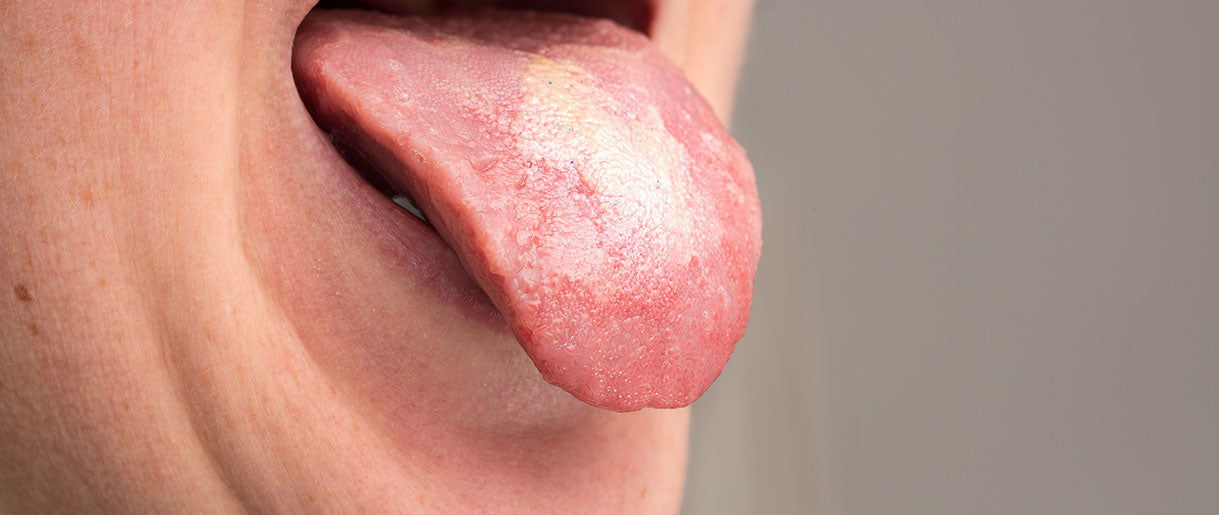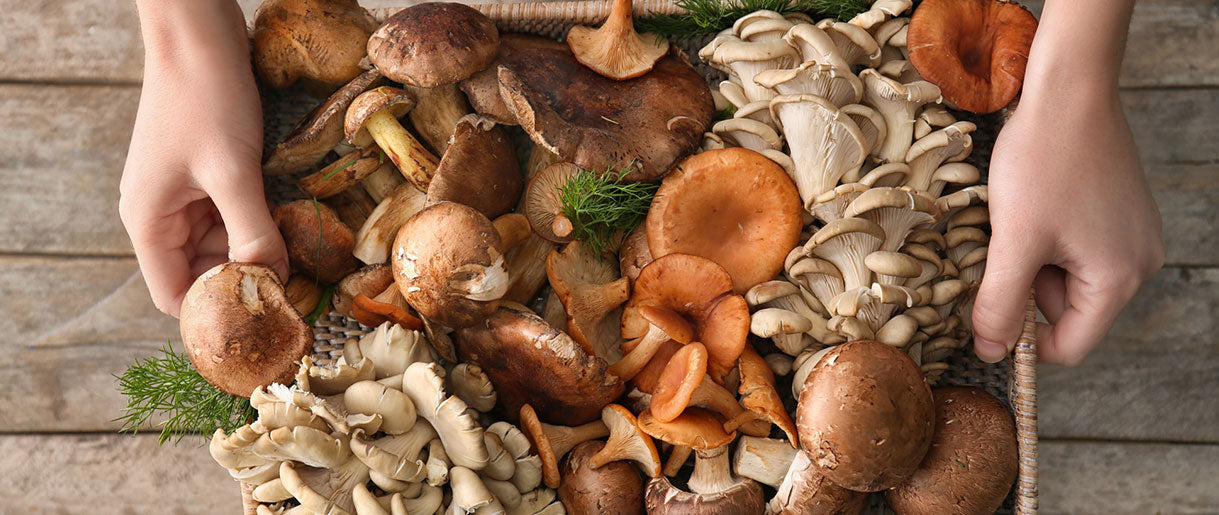Ever considered that your dog's next big health boost might come packaged in nature's understated gift: mushrooms?
In the holistic health buzz, our furry companions aren't left behind, and the spotlight is now on the surprising benefits of certain mushrooms for dogs. Yes, amidst skepticism and curiosity, these fungi are not just for pizza toppings or gourmet dishes; they're turning heads and wagging tails in the canine wellness arena.
When we talk about mushrooms for dogs, we're zeroing in on specific types known for their health-enhancing properties. Safe, beneficial varieties like Reishi, Lion's Mane, Turkey Tail, Maitake, Cordyceps, and Shiitake could support your dog's immune system, improve vitality, and aid emotional well-being. However, distinguishing these from toxic types is crucial to exploring mushrooms as a wellness tool.
Dive in as we unpack the mystery, utility, and precautions in introducing these specific mushrooms into your dog's diet. This journey promises to reshape common perceptions and open doors to a fascinating new chapter in your pet's health narrative. Are you ready to see mushrooms in a whole new light?
Unveiling the Mystery: What's in a Mushroom?

The Buzz Around Medicinal Mushrooms
Dive into any wellness forum, and you'll spot the term "medicinal mushrooms" popping up more than just a couple of times. These edible fungi have vaulted from the underbelly of herbal medicine into the limelight, promising a slew of health benefits.
But not all mushrooms are created equal. While certain mushroom species have been celebrated in traditional medicine, others could do more harm than good.
It's the medicinal mushrooms that hold a special place in health discussions—the health benefits of these mushrooms make them stand out.
Not Just Your Ordinary Fungi
These aren't your typical kitchen varieties. Medicinal mushrooms are packed with bioactive compounds that promote healthy immune function.
Imagine your dog, healthy body weight, fur glossy, and eyes bright. That's where medicinal mushrooms work their magic, rich in elements like beta-glucans that amp up immune support, bolstering their overall health.
Science Behind the Magic
How do they work? The secret lies in the intricate interplay between these bioactive compounds and your pet's immune system.
These compounds don't just boost immune function (1); they modulate it, working to ramp up or cool down the immune response as needed. The health benefits of certain mushroom species are causing a stir because they're about holistic health, not just fighting off sniffles.
Nature's Wellness Revolution
However, remember, not all mushrooms are your friend. Integrating medicinal mushrooms into your pet's regimen isn't about sprinkling some chopped caps into their bowl.
It's about harnessing the potential health benefits identified in centuries of traditional medicine, now backed by modern science.
In essence, they're a wellness revolution, echoing herbal medicine practices. So, when considering medicinal mushrooms, you're considering a natural, health-boosting phenomenon grounded in ancient wisdom.
Can Dogs Eat Mushrooms? Debunking Myths

Navigating the world of pet wellness, a question often surfaces among dedicated dog owners: "Can dogs eat mushrooms?"
It's time to address this query head-on, debunking myths and setting facts straight with insights backed by thorough research and expert opinion.
Mushrooms and Dogs: A Cause for Concern?
One can't deny that wild mushrooms and dogs don't mix well. With the plethora of wild mushrooms out there, many are toxic to our furry friends, causing everything from mild digestive upset to severe poisoning.
This fact spurs the most significant misconception: "All mushrooms are bad for dogs." However, while caution is wise, it's not the whole story.
Beyond the Wild: Safe Options for Canine Consumption
Here's where it gets interesting. Despite the risks associated with wild mushrooms, certain types of mushrooms good for dogs do exist.
Yes, you read that right. Varieties like turkey tail mushrooms and other medicinal mushrooms for dogs are gaining attention for their health-promoting properties.
But it's not about letting your dog chow down on any mushroom they sniff out during a walk. It's about controlled, intentional inclusion of specific species known for their benefits.
Expert Insights: Vet-Approved Fungi

What do the experts say? Veterinarians and canine nutritionists shine a light on this topic, emphasizing that not all mushrooms spell trouble.
The best mushrooms for dogs aren't the wild types but those cultivated for their essential nutrients and medicinal properties.
When we talk about medicinal mushrooms for dogs, we're focusing on only the fruiting bodies or mycelium that contain a powerhouse of benefits for immune health, among other advantages.
The conversation around mushrooms and dogs doesn't stop at "yes" or "no." It ventures into how medicinal mushrooms positively impact dogs' health. From supporting immune function to providing essential nutrients, these fungi are slowly carving their niche in canine wellness.
But remember, the keyword here is "medicinal." These mushrooms, studied for their biomolecular and clinical aspects, are what you should consider.
It's not about randomly selected mushrooms but about those recognized for their health benefits, like turkey tail or other well-researched species.
Choosing the Best Mushroom for Dogs
So, is mushrooms good for dogs? The answer is a resounding yes—with the right approach. The best mushroom for dogs is one recognized for its health-promoting properties, backed by science, and endorsed by experts.
Steer clear of the wild, unpredictable varieties, and embrace the researched, validated potential of medicinal mushrooms for dogs' health.
Super Shrooms: Types of Mushrooms and Their Benefits for Dogs
As we venture beyond common misconceptions, there's an array of fantastic fungi that promise to boost your dog's health and have also proven their mettle in the canine world.
Let's unveil these dog-friendly mushrooms, showcasing why pet parents are integrating them into their furry friends' diets everywhere.
1. Turkey Tail Mushroom: Nature's Support Against Serious Ailments

Famed for its striking layers of vibrant color, the turkey tail mushroom is more than just a pretty sight. It's a powerhouse, often coupled with conventional cancer treatments due to compounds derived from it that fortify white blood cells (2).
Yes, these mushrooms are known allies in the fight to treat cancer (3). In addition to the turkey tail cancer benefits, these mushrooms even support dogs battling kidney disease. Not to mention, they're great for maintaining a healthy liver function!
2. Reishi Mushrooms: The Panacea for Immunity and Allergies

Often revered as the "mushroom of immortality," Reishi mushrooms (Ganoderma Lucidum) work wonders in boosting your dog's immune system (4).
These mushrooms, known for their anti-inflammatory properties (5), can alleviate allergy symptoms and even combat viral infections. The benefits of Reishi mushrooms make them particularly beneficial for senior or young dogs needing immune fortification.
3. Shiitake Mushrooms: Protector of the Heart and Nervous System

Beloved in culinary circles, shiitake mushrooms are a boon for heart health (6) and nervous system function.
Rich in essential nutrients, they're known to regulate blood pressure and cholesterol, vital for canine cardiovascular health.
4. Maitake Mushrooms: The Weight Management Champion

Obesity in pets can lead to severe health issues, but guess what? Maitake mushrooms can help maintain your dog's weight (7).
Maitake mushrooms promote weight loss in multiple ways. These mushrooms regulate blood sugar levels, helping prevent weight gain and energizing your pooch!
5. Cordyceps Mushrooms: Enhancing Stamina and Respiratory Health

For dogs involved in sports or activities requiring high endurance, Cordyceps mushrooms are a godsend. Cordyceps boost energy, a fact backed by scientific research (8). They improve stamina and respiratory health, ensuring your furry companion stays active and happy.
6. Lion's Mane: The Brain Booster

This unique, pom-pom-like mushroom is famed for supporting brain health (9). It's excellent for enhancing cognitive functions, especially for senior dogs facing neural degeneration.
Red Flags: Mushrooms to Avoid and Safety Tips
While we've extolled the virtues of various mushrooms for dogs' health, prudence requires us also to explore the other side of this mycological world.
Not every mushroom is a friendly, medicinal mushroom. Some pose severe risks to your furry pals, and understanding this distinction is critical.
The Perilous Side of Fungi: Toxic Varieties Galore
In the diverse kingdom of fungi, certain members rightfully earn the title of 'villains.' These are not your medicinal mushrooms for dogs; they're the toxic types that can cause harm in a single bite.
Amanita phalloides, known as the "death cap," stands notorious in this category, alongside others like the false morel. They're not just bad mushrooms for dogs; they're lethal.
Foraging Faux Pas: Steering Clear of Danger

For the nature-loving dog owner, a walk in the woods with your four-legged friend is bliss. But this idyllic scenario holds hidden dangers. Dogs are naturally curious, and their foraging can lead them to some serious trouble, mushroom-wise.
Here's a rule of thumb: avoid wild foraging for mushrooms. It's incredibly challenging to distinguish between what's safe and what's deadly.
Even mushrooms good for humans, like the shiitake mushroom, can cause adverse reactions in dogs, emphasizing the difference in human and canine physiologies.
Safety First: Contamination and Quality Control
Even when you opt for the best dog mushrooms sourced from reliable suppliers, another risk lurks: contamination. Mushrooms are bioaccumulators, meaning they absorb the properties of the environment they grow in—good or bad.
Therefore, ensuring you source mushrooms from reputable, quality-focused vendors is crucial. This practice safeguards against contamination that could turn a medicinal mushroom into a health hazard.
The Role of Expert Guidance in Mycology and Canine Health

The realm of mushrooms and dogs is intricate, necessitating a balanced approach informed by veterinary medicine.
A consultation with your vet is essential before introducing any new element into your pet's diet, including dog mushrooms.
They can provide insights specific to your dog's health, considering existing conditions and possible drug interactions.
Integrating Mushrooms into Your Dog's Diet: The How-To Guide
Embarking on the mushroom journey with your pet means finding creative, safe, and palatable ways to make these medicinal mushrooms a regular part of their meals.
Whether you have a picky eater or an omnivorous pup, these fun tips and tricks will help you seamlessly introduce mushrooms for dogs health into their diet.
The Supplement Route: Easy and Efficient
Mushroom supplements might be your best bet if you're looking for ease and efficiency. These come in various forms, like mushroom powder or mushroom extracts, and can be effortlessly mixed into your dog's regular food.
Products like Lion's mane mushroom extract or Reishi mushroom extract are packed with health-boosting benefits. Ensure you're using supplements derived from real mushrooms to give your pet all the amino acids, digestive enzymes, and beneficial compounds they need.
Making Mushrooms Palatable: For the Fussy Eaters

Some dogs might turn their noses up at unfamiliar foods, and if mushrooms are new on the menu, you might face some initial resistance.
For these fussy eaters, start by introducing mushrooms slowly. You can combine finely ground mushroom powder with foods they can't resist. Gradually increase the amount as they get used to the taste.
Liquid Love: Mushroom Extracts for the Win
Liquid forms of mushroom supplements are excellent for ensuring your dog gets the full spectrum of benefits, especially if they're cancer patients or have specific health conditions. Depending on your dog's preference, mushroom extracts can be mixed into wet food or even added to water.
DIY Mushroom Treats: Homemade Goodness

If you're into homemade dog treats, why not incorporate some mushrooms safe for canine consumption?
With a base of dog-friendly ingredients and a dose of mushroom powder or finely chopped real mushrooms, you can create treats that deliver nutrition and taste in every bite.
Mushroom For Dogs Video
FAQs About Mushrooms for Dogs
Can Mushrooms Have Side Effects On My Dog's Health?
While medicinal mushrooms offer numerous health benefits for dogs, they can also have side effects, especially when administered inappropriately. Some dogs might experience digestive upset, including diarrhea or vomiting, particularly when introducing mushrooms into their diet initially.
Moreover, individual dogs may have allergies to specific mushroom species, manifesting in skin irritations, itching, or more severe allergic reactions. It's crucial to start with small dosages, monitor your pet closely for any adverse reactions, and consult with a veterinarian before significantly changing your dog's diet or supplement regimen.
How Can I Be Sure I'm Buying High-Quality Mushroom Products For My Dog?
Ensuring you purchase high-quality mushroom products requires a bit of research and diligence. First, opt for products from reputable brands known for their commitment to quality and transparency.
Look for detailed labels that specify the product contents, confirm that the mushrooms are organically grown, and avoid fillers and artificial additives. Certifications from third-party testing organizations can also attest to a product's quality. Lastly, reading customer reviews and consulting with your veterinarian can provide additional insights and recommendations.
Are Raw Mushrooms Safe For Dogs To Eat?
Not all raw mushrooms are safe for dogs. While some medicinal and culinary mushrooms can be beneficial, certain wild or raw mushrooms are toxic to dogs and can cause severe poisoning.
The safest approach is to avoid feeding your dog raw mushrooms, particularly those foraged from the wild, as misidentification can lead to serious consequences.
Instead, rely on specially formulated mushroom supplements or treats designed for canine consumption, which undergo processes that both ensure safety and enhance the bioavailability of the beneficial compounds.
Key Takeaways
As we've journeyed through the forest of facts, debunked myths, and navigated the landscape of mushrooms and canine health, one thing stands clear: the natural world holds profound healing and wellness capabilities, often more than we can imagine.
In all their varied forms, mushrooms are not just a culinary delight but a reservoir of health-boosting potential for us and our four-legged companions.
From the immune-enhancing prowess of turkey tail mushrooms to the nerve-nourishing properties of lion's mane, these fantastic fungi present a frontier of wellness waiting to be explored and integrated into our pets' lives.
However, this path requires careful navigation. The responsibility, love, and care we owe to our pets mean making informed, safe, and health-conscious decisions on their behalf.
So, whether you're considering a sprinkle of shiitake, investing in Reishi extracts, or baking up a homemade mushroom treat, remember: you're not just feeding your dog. You're elevating their health, potentially prolonging their life, and most certainly deepening the bond you share through these acts of mindful nourishment.
As we close this chapter on mushrooms for dogs, the conversation, dear reader, is far from over. In fact, it's just beginning, and your voice is a vital part of this ongoing dialogue.
Have you tried introducing medicinal mushrooms into your dog's diet? What experiences, tips, or stories do you have to share?
Every journey is unique, and your insights are invaluable. Join the discussion below by leaving a comment, and together, let's forge paths toward holistic health for our faithful canine companions.🐾
References
- Effects of beta-glucans on the immune system, (1), https://pubmed.ncbi.nlm.nih.gov/17895634/
- Trametes versicolor (Synn. Coriolus versicolor) Polysaccharides in Cancer Therapy: Targets and Efficacy, (2), https://www.ncbi.nlm.nih.gov/pmc/articles/PMC7277906/
- Therapeutic Effects of Medicinal Mushrooms on Gastric, Breast, and Colorectal Cancer: A Scoping Review, (3), https://www.ncbi.nlm.nih.gov/pmc/articles/PMC10183216/
- Immuno-physiological effects of dietary reishi mushroom powder as a source of beta-glucan on Rohu, Labeo rohita challenged with Aeromonas veronii, (4), https://www.nature.com/articles/s41598-023-41557-9
- Anticancer and Anti-Inflammatory Properties of Ganoderma lucidum Extract Effects on Melanoma and Triple-Negative Breast Cancer Treatment, (5), https://www.ncbi.nlm.nih.gov/pmc/articles/PMC5372873/
- Lentinula edodes (shiitake mushroom): An assessment of in vitro anti-atherosclerotic bio-functionality, (6), https://pubmed.ncbi.nlm.nih.gov/30581314/
- Grifola frondosa (Maitake) Extract Reduces Fat Accumulation and Improves Health Span in C. elegans through the DAF-16/FOXO and SKN-1/NRF2 Signalling Pathways, (7), https://www.ncbi.nlm.nih.gov/pmc/articles/PMC8620745/
- Pharmacological and therapeutic potential of Cordyceps with special reference to Cordycepin, (8), https://www.ncbi.nlm.nih.gov/pmc/articles/PMC3909570/
- Neurotrophic properties of the Lion's mane medicinal mushroom, Hericium erinaceus (Higher Basidiomycetes) from Malaysia, (9), https://pubmed.ncbi.nlm.nih.gov/24266378/










Let Us Know Your Comments